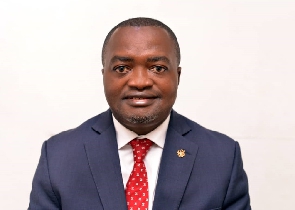 Hon. Emmanuel Marfo (Dr), Member of Parliament - Oforikrom Constituency
Hon. Emmanuel Marfo (Dr), Member of Parliament - Oforikrom Constituency
I listened to the President's State of the Nation Address delivered in Parliament on Tuesday, 5th January 2021 and one issue he raised that struck me was the need to renew the debate on galamsey.
Illegal small-scale mining, popularly known as galamsey in Ghana remains one of the politically sensitive livelihood and environmental issues; it has often featured high during election campaigns. The rhetoric on whether to abandon it or tolerate it within a certain management regime has been pervasive.
However, the larger public interest in the subject has not been equally matched by how to deal with it in policy and practice. My objective for writing this article, inspired by my own background as an environmental policy scientist, a legislator and pro-green development activist, is to table a few ideas on how to move forward.
I strongly share the call by the President for a renewed national debate on the subject towards building policy consensus on the matter.
The overarching constitutional imperative for the call is dictated by Article 36(9) of the 1992 Republican Constitution which states that 'the State shall take appropriate measures needed to protect and safeguard the environment for posterity; and to seek cooperation with other states and bodies for purposes of protecting the wider international environment for mankind.'
Arguably, galamsey is a case of natural resource conflict and generally public policies to manage this conflict have not been able to reconcile the tension between its financial (economic) imperatives and associated environmental exigencies.
There is no doubt that galamsay provides at least 30% of Ghana's gold outputs, supports millions of livelihoods and therefore has some positive contributions to the Ghanaian economy at large. However, the debate against the practice has been its negative socio-economic and environmental impacts.
Empirical studies have associated high turbidity, low levels of dissolved oxygen, mercury pollution, high cost of reclamation and negative social impacts such as school dropouts with galamsey.
The high point of the environmental debate has been pollution and the high cost of reclamation; in fact one study estimated that we need about 250 million US dollars to reclaim land and water impacted by galamsey in the Western region of Ghana alone.
The literature on these impacts is growing, even though they are still scanty and scattered compared to the public interest in the subject. While there is still the need for more scientific research on the impacts of galamsey, there is, even importantly, the need for a more robust cost benefit analysis to inform policy. Unfortunately, this has been hindered by the structural weakness of science-policy linkage in Ghana.
I will argue here that there is no way we can have a robust policy debate unless we have embarked on a rigorous cost benefit analysis on galamsey. We cannot simply project the argument that galamsay provides livelihood support to millions of people without a valuation of its environmental and ecosystem impact in nearly monetary terms; the currency that policy actors understand and use to advance their debates.
In much the same way, we cannot simply rubbish the practice as polluting and devastating the environment without balancing this effect with its socio-economic impact. The problem is that the debate on how to deal with galamsay has not benefited from a deeper analysis of its economic benefit and environmental cost.
Pro galamsey actors have often sought to highlight the socio-economic benefits whilst those against it have always projected the environmental impacts aspects. Once there is a call for national debate, I submit that our think tanks and researchers have urgent tasks to help us find a common ground; one that is grounded in scientific research and holistic analysis.
In this regard, a collaborative learning involving approach will be more useful. Scientists and policy facilitators must talk and weigh the economic benefits and environmental impacts evidence together in order to build consensus on how to deal with galamsey in policy and practice.
The use of 'force' cannot be an effective approach; indeed the literature on natural resource conflict and development should suggest to us that we do not have any global best case on the effectiveness of the 'military' approach.
Therefore, if the President's call will have any practical meaning going forward, the Ministry of Environment, Science and Technology and Innovation (MESTI) should play a leading role in facilitating this collaborative learning among key stakeholders. We can learn useful lessons from the multi stakeholder dialogue process adopted in the forestry sector in dealing with illegal logging in Ghana.
We must reinforce the science-policy synergy needed to generate a practice that can help us balance the economic and environmental imperatives of galamsey. The time for the Ministry to focus and act is now. Thank you Mr President for renewing the call for action on galamsey.
The author, Hon. Emmanuel Marfo (Dr) is the Member of Parliament - Oforikrom Constituency